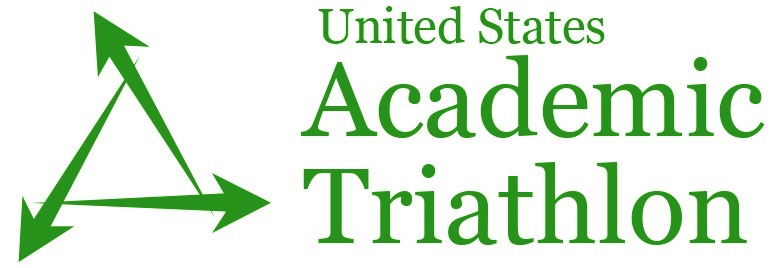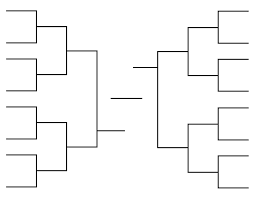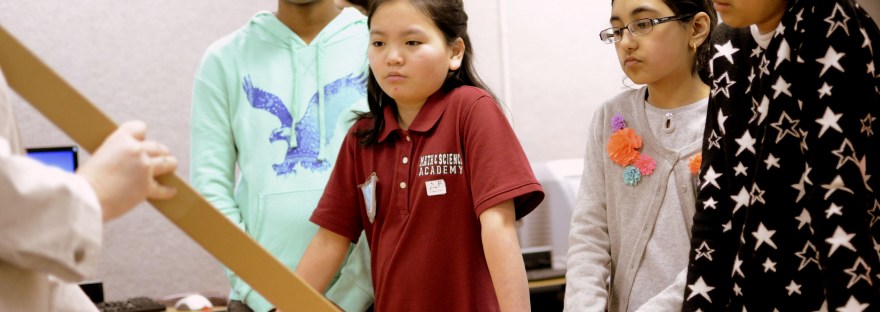While the primary responsibility of students participating in a US Academic Triathlon Meet is to compete in the three events, there are additional responsibilities each student is held to for the sake of good sportsmanship and teamwork:
1. All team members, including alternates, must wear a name tag and a competition letter above the waist in a way that can easily be seen and read by facilitators and participants. This is to easily identify student participants throughout the Meet, and differentiate them from visitors and other students who might be involved in something else going on in the school.
2. All team members must keep problems and questions secret until the end of the Meet. If any student is found to be sharing questions or other information with members of other teams, their coaches, or volunteers before the end of a Meet, the student’s entire team will be disqualified and may be subject to further censure.
3. All team members must exhibit good sportsmanship and respect for all facilities and people before, during, and after the Meet. Teams who exhibit unsportsmanlike conduct of any kind are subject to loss of points and possible disqualification for serious infractions.
4. Theater etiquette during P.A.R.T.Y. in a Box presentations is expected, and that means full, silent attention during performances. No derogatory comments or other inappropriate behavior will be tolerated, as watching other teams’ P.A.R.T.Y. presentations is a privilege. It is appropriate – and appreciated – for students to laugh, clap, and enjoy other teams presentations. Additionally, students and coaches may not talk to or approach P.A.R.T.Y. judges regarding scoring questions. Student feedback should be limited to general and impersonal helpful hints and compliments.
5. Teams must strictly adhere to the schedule. If a team arrives late for an event after a Meet starts, they will be allotted only the remaining time allowed. If a late team prevents another team from having the full time allotted, the late team will be subject to an unsportsmanlike conduct penalty.
6. Students may not bring anything into an event room, except the team’s Competition Kit as it is specifically described in the Program Manual. If a student requires any special equipment or item for health or mobility reasons, it must be checked in at the registration desk prior to a Meet.
NEW THIS YEAR: Students will not be allowed to have a smart device of any kind (phone, watch, tablet, etc.) on their person during a Meet. Any smart devices must be left in the student’s backpack or with their coach during a Meet. Failure to abide by this rule may be subject to penalties or disqualification (especially if a smart device is used during an event). If a facilitator sees a student using a smart device, even during passing time, it will be taken away for the duration of the Meet and may cause the team’s disqualification. This rule was instated to ensure no one can be suspected or accused of cheating, even if checking the time.
7. Teams must use appropriate language, humor, music, and gestures during Meets. No racism, sexism, profanity, etc. If a team member offers an inappropriate response, a facilitator will: a) ask for a more appropriate response; or b) assess a penalty; or c) disqualify a team member or team from a round or an entire Meet. If a student wonders whether something is an appropriate response, it is better to find a substitute answer just to be safe.
8. UPDATED: Students whose temporary or permanent physical impairment may prevent or hamper them from following physical instructions during a Meet must inform their coach at least a week prior to the upcoming Meet (when possible) so the coach can determine necessary accommodations and connect with the upcoming Meet’s Host/Facilitator in order to coordinate such accommodations.
9. Students must be aware of the meaning of these “Caution Comments”:
a. “Louder” – A student should repeat the answer, enunciating for the sake of the facilitator.
b. “Clarify” – A student must explain why an answer is pertinent to the question. (If the student says “Make a boat” as a use for the flyswatter, it may be necessary for the student to say, “Use the handle as a raft,” so the judge can score it.)
c. “Inappropriate” – A student is being given a chance to change a socially unacceptable or non sequitur answer, with or without loss of points, depending upon intent.
d. “Repeat” – A student has given a duplicate answer and must come up with another response.
If there are any questions about student expectations, contact Executive Director Sarah Sheldon at sarah@usacademictriathlon.com.





